The Trump Administration is populated by senior figures who are deeply religious, most notably Vice President Mike Pence, an evangelical Christian, and Secretary of State Mike Pompeo, who recently gave a widely covered speech on what he called “Christian leadership.” Not surprisingly, these and other administration figures claim that promoting religious freedom around the world is one of their top foreign policy priorities.
But long before the Trump Administration took office, the federally chartered U.S. Commission on International Religious Freedom was a primary instrument of this policy goal. But how does a commission, created by an act of Congress but with no executive power or reach of its own into foreign countries, pursue its objective?
In an exclusive interview with VOA’s Navbahor Imamova, the Commission's Vice Chair Nadine Maenza discusses its mission, the commissioners’ engagement with Washington and foreign governments, and how they interact with religious leaders and civil society, including in Central Asia. But given the orientation of the administration and some of the perceptions of it in countries like Uzbekistan, Maenza argues that this entity should not be seen as a “Christian" board, specifically attempting to promote that religion, in particular.
Transcript, October 17, 2019
Navbahor Imamova, VOA: Mrs. Maenza, thank you so much for agreeing to talk to us.
Nadine Maenza, USCIRF: Thanks for having me. Glad to be here.
Navbahor Imamova, VOA: This is actually our first interview here in the building. We have had [commissioners] come to VOA before and talk to us, but, today we thought we should come and explore the [commission] through you. We know you as one of the leading members of the board, and you have been a member since 20...
We really don't find that these issues divide us on partisan lines at all.
Nadine Maenza, USCIRF: ... 18, so yeah, May of 2018 I was appointed by President Trump to be a commissioner. There's nine of us, commissioners, that oversee the work, and we're appointed by leaders in Congress, all the Democratic and Republicans who are very much bipartisan. In fact, we brag that we're the best bipartisan, maybe only. We really don't find that these issues divide us on partisan lines at all.
Navbahor Imamova, VOA: Yeah, that's something that we have heard from the United States Commission on International Religious Freedom a lot, that, "we're bipartisan"... But, you know, it's very interesting, each time we talk to someone, the person representing the board describes the mission differently. There's a lot of consistency, but the way people see their mission, their role... So, I'm going to start this conversation with that question: How do you see your role in the context of American foreign policy?
Nadine Maenza, USCIRF: Right, well, I think the reason we were created, and the mandate we have is so important, and I see it play out all the time, especially if you look at world events right now, so what we're really to do is to assess religious freedom conditions abroad, and make recommendations to our own government. So we go to the White House, we make recommendations to the president. We make recommendations to Congress, and to the Secretary of State, and the neat thing about what we do is we don't consider the bilateral situation. We don't consider what's happening in, say for instance a country like Saudi Arabia. We don't consider what's happening around them, what's going on internally, we just call them out if they have violations of religious freedom, and we make recommendations based on that. So, we really play this important role. We're not letting religious freedom get pushed aside for other reasons, because it's such a core part of our foreign policy.
We're not letting religious freedom get pushed aside for other reasons, because it's such a core part of our foreign policy.
Navbahor Imamova, VOA: So you, despite what's happening bilaterally, despite what's happening strategically, geopolitically, you want...
Nadine Maenza, USCIRF: We call a spade a spade, when it comes to religious freedom.
Navbahor Imamova, VOA: For the religious freedom to be on the table as a critical value?
Nadine Maenza, USCIRF: Exactly, and a country should be, you know, punished or called out if they have egregious violations of religious freedom regardless of what else is happening in that country or what our relationship is like with them.
Navbahor Imamova, VOA: Are there any other entities with similar missions around the world? Who do you partner with?
Nadine Maenza, USCIRF: Not really. We partner with a lot of NGOs, and a lot of governments that are willing to partner with us, but we really haven't seen anyone quite the same mandate that we have. But, we would be excited to see other countries follow.
Navbahor Imamova, VOA: So, the Europeans don't have it?
Nadine Maenza, USCIRF: You know, they have envoys, and a lot of them do, you know, send out somebody, kind of like the State Department has the Ambassador for Religious Freedom... right now with Ambassador Brownback. They have similar envoy type, but they are not quite as independent as we are.
... a country should be, you know, punished or called out if they have egregious violations of religious freedom regardless of what else is happening in that country or what our relationship is like with them.
Navbahor Imamova, VOA: What is the difference between what Ambassador Brownback does and what USCIRF does? Isn't he doing what the Commission should be doing?
Nadine Maenza, USCIRF: No, it's really completely different. So he's actually an ex officio member of the Commission, so, he does join us from time to time, but what he does, is he works within the administration, and obviously has to consider those bilateral things that happen, and that he's part of a group of people that are making decisions about policy, where we're just calling out religious freedom. We're making recommendations for how the U.S. government can move countries towards religious freedom. I think that's important to know we have a goal in mind, which is, to move them towards offering freedom, and then they can start seeing the benefits of that in their own country.
Navbahor Imamova, VOA: So, as you said, you regularly work with the lawmakers and policy makers here in Washington.
Nadine Maenza, USCIRF: Right, we do events as well, we brief them, we brief their staff. We also do special events, or special reports like about religious freedom and women, or education. We did important work on the textbooks coming out of Saudi Arabia. So, we also adopt religious persons of conscience to call out, tell the stories of people who are suffering because of their religion. And, we also just launched, literally last week, a victims database. So, we're going to be keeping track of victims in countries that we've recommended be countries of particular concern where there are victims of religious persecution. So, you can go to this one website, look up people, learn more about who is in jail because of their religion.
Navbahor Imamova, VOA: We know that your reports are read widely. We know that because we've been covering the issues over a long time. But your prescriptions are not always followed.
And, we also just launched, literally last week, a victims database. So, we're going to be keeping track of victims in countries that we've recommended be countries of particular concern where there are victims of religious persecution.
Nadine Maenza, USCIRF: No, we find that they're not always easy.
Navbahor Imamova, VOA: Yeah. So, the question is, what kind of levers as a commission do you have to make sure that what you're recommending becomes a reality? I'm sure that's the biggest challenge for you, right?
Nadine Maenza, USCIRF: It definitely is.
Navbahor Imamova, VOA: Because it's different to work with lawmakers and policymakers, but for regions like Central Asia, it's really the policymakers who are making the call at the end of the day as far as we know.
Nadine Maenza, USCIRF: Yeah, there are some countries that want to get off all of our list. There are some countries like Uzbekistan that's trying to get off our list. They'll talk to us about what they're doing, and we can make recommendations to our own government. They're more interested in instituting those, because they want to see the country move towards religious freedom. But there are the countries, you know, North Korea isn't listening to. China, you know, is not actively engaged with us. They don't want to get off our list. They probably wear it as a badge of honor. You know, so we have less opportunities, but still even then, we're making recommendations to our government. Things like, you should sanction, like in Russia, you should specifically sanction people that are overseeing abuses for religious freedom, and different things they can do to at least there will be a consequence for people that are committing these violations, so that that will be a deterrent maybe to others to want to continue in that same way.
Navbahor Imamova, VOA: How often does your [commission] get requests from the U.S. government to recommend something or to advise?
Nadine Maenza, USCIRF: I think pretty regularly. Our staff is constantly in relationship with their counterparts at State, and at Department of Defense, and other places we go. In fact, we were just there briefing earlier today. So, there's a lot of interaction. So it's a pretty regular thing.
Navbahor Imamova, VOA: And, you have these annual reports that a lot of people read as I said. Before they become public, do you show them to the U.S. government? Do they get to look at it?
Nadine Maenza, USCIRF: You know, we sometimes do get recommendations, we do sometimes share information and ask for them to give their input, and we certainly collect information from a lot of different sources before we put it in. But we don't give editing ability to anybody. It's very much independent, our voice, the information we've pulled together. This is what we believe are the best recommendations for those countries.
Navbahor Imamova, VOA: Well, I know that you were in Uzbekistan in September.
Nadine Maenza, USCIRF: Yes.
Navbahor Imamova, VOA: And, we believe that you had some productive meetings there.
Nadine Maenza, USCIRF: We did.
Navbahor Imamova, VOA: How are you analyzing the current situation there. There is a sense is that things are improving in general. But the Uzbek government isn't necessarily making any political changes. But, the overall assessment is that things are improving as far as the U.S. government is concerned, and also, they're looking at this in the context of bigger strategic goals in Uzbekistan.
We would love nothing better than to take Uzbekistan off our Tier 1 list, or our Tier 2 list frankly, and we would if they follow through with the roadmap.
Nadine Maenza, USCIRF: Right, right. You know, there was this period of time where there was great progress that was very exciting you know, and the government engaged with UN Rapporteur for religion and belief, Ahmed Shaheed. They put together this roadmap and made some promises, and made some, you know, guarantees that they were going to do certain things by certain times, and it was enough for the State Department to take them off their countries of particular concern list and put them on the watch list. You know, we didn't quite feel that it was time to do that. The Commission has their own recommendations for that Tier 1 list we call it, which would be the CPC list, and we really didn't feel like that was enough, just saying I'm going to do stuff. We wanted to see it actually get done before we took them off the list. We would love nothing better than to take Uzbekistan off our Tier 1 list, or our Tier 2 list frankly, and we would if they follow through with the roadmap.
And we really feel like if they did get off all of our lists, chances are they'd get more economic development, you know. They immediately would be seen as a more stable country for engagement and bilateral agreements. So, for them it's only up. There's only good things that would come from them moving towards religious freedom, but you know, our main concern was really this 1998 law on freedom of conscience and religious organizations that they've promised to amend, and really they haven't.
Navbahor Imamova, VOA: And when you were there recently who did you meet?
... our main concern was really this 1998 law on freedom of conscience and religious organizations that they've promised to amend, and really they haven't.
Nadine Maenza, USCIRF: We were able to meet with Senator Safayev, and, you know, he's been a great...
Navbahor Imamova, VOA: The main spokesperson?
Nadine Maenza, USCIRF: Yeah, for religious freedom. Right, and we really appreciate all that he's done, and appreciate his enthusiasm and his hard work. You know, and we made it clear that we wanted to see the roadmap actually instituted like they promised, that we wanted to see these laws changed like they promised, and, we're hopeful, but, we haven't seen that change yet. We also were able to meet with the Minister of Justice, Ombudsman for human rights, and the Grand Mufti. We also met with the deputy governor of the name, I'm sorry...
Navbahor Imamova, VOA: Ferghana.
Nadine Maenza, USCIRF: Ferghana yes. It was wonderful and was helpful in helping us understand even how it plays out locally, and so, we had good meetings, and we appreciate that they were willing to have dialogue with us. But, we know there's still a little bit of reluctance to move as quickly as I think they were hoping to move initially when they made all these guarantees.
... we know there's still a little bit of reluctance to move as quickly as I think they were hoping to move initially when they made all these guarantees.
Navbahor Imamova, VOA: And, I'm sure you've been watching the way the Uzbek government has been evolving in terms of discussing religious freedom in Uzbekistan. So, now we know that the government doesn't want hijabs. They want scarves, for example.
Nadine Maenza, USCIRF: Head coverings.
Navbahor Imamova, VOA: Yeah, head coverings, right? So, we finally know where the government stands.
Nadine Maenza, USCIRF: I don't think I heard the word hijab once.
Navbahor Imamova, VOA: Because for the longest time Uzbek officials would say, "We have no laws restricting beards or hijabs." But now, we know, that even President Mirziyoyev has made it very clear recently that he prefers Uzbek style scarves. He thinks that Uzbek women look much better, and, the Uzbekness is better represented by wearing Uzbek style scarves rather than hijabs. And then, we also talked to the Grand Mufti, who you also met in Tashkent, when he was visiting Washington this summer, and he also was very eloquent in explaining that it's really the scarves... The reason I'm asking is that, you know, how much time do you spend discussing beards and hijabs with the Uzbek government, because the conversation, general debate in Uzbekistan evolves around those two issues right now when it comes to religious freedom?
Nadine Maenza, USCIRF: Right. I know we worked a lot, spoken out a lot about the hijabs and the right that people should have to practice their faith, and that's a part of their faith. And so, to expect, especially like, you know, a woman that's going into a school to study her faith to take her hijab off, it doesn't make a whole lot of sense. So we're continuing to speak out on that, and, the beard shaving, it just broke in when we first came, so it had just happened, and you know, and then there was a reshuffling where people were fired, and you know, replaced, and everyone was kind of like, oh, it was a mistake. But then when we were there, we heard more incidents that perhaps there was other times that men were rounded up and forcibly had their beards shaved.
Nadine Maenza, USCIRF: And, of course, since we returned, we again have heard in a different city that beards have been shaved. So, we're very concerned about why this is happening and how it's inconsistent. Completely inconsistent with the roadmap, and with the promise that they're going to move towards religious freedom.
Navbahor Imamova, VOA: So when these issues are asked about, when we inquire about these, lets say, controversies, with the Uzbek government, and when we mention your reports, for example, the U.S. calls for more religious freedom in Uzbekistan, your commission, no just by Uzbekistan, but by several Central Asian governments, is usually described or seen in three ways. One way is that they see you as a very American group. They say "they don't understand us... They don't look into our social political context... They come, and they preach, and they tell us what is religious freedom. ... We have our own mentality."
... we use Article 18 of the Universal Declaration of Human Rights to be the bar, the standard. Everyone should have the right to freedom of thought, conscience, and belief.
So, that's one way they see you. And, another way is that they say you paint the situation in white and black, and that you don't really have a very constructive approach... That's one criticism that we hear a lot towards your commission. And, another one, which I think is very heavy - they see you as a heavily influenced Christian group. They see you as an group of hardcore Christians who want to change the world through these reports, and have some kind of a direct influence on the political systems in those countries. How do you respond to these views?
Nadine Maenza, USCIRF: First of all, we're really careful that we use Article 18 of the Universal Declaration of Human Rights to be the bar, the standard. Everyone should have the right to freedom of thought, conscience, and belief. So, you know, we're not coming to a country and in any way, shape, or from comparing them to the United States, or comparing them to the Constitution of the United States. So, we're comparing them to an international document. And, we really do have the bar set for international standards, and, we repeatedly said this in our meetings in Uzbekistan that, you know, the fact that there are 11 steps to get registered for a religious organization in Uzbekistan is not the normal. I mean, we talk about how hard it is to get registered in a place like Egypt, and there's one committee that approves houses of worship.
So, you know, the standard in Uzbekistan for registration is far higher than the international standards, so we really do look at an international standard in how we asses countries. In terms of us being a Christian commission, if you look at our work over the last, what, 12 months, 24 months, I think you're going to see very few... I mean it doesn't seem like Christian focused things much at all. You know, we've really been following the hot spots, and I think for a while the hot spots were against Christians in the Middle East. So, that was a focus, because that was a place that needed that attention. But the cover of our report, you know, this last year was the Uighur Muslims in China, and then the year before it was the Rohingyas. And, it wasn't because of they were Muslims, it was because it literally was the worst human rights religious freedom violations in the world.
So, you know, the standard in Uzbekistan for registration is far higher than the international standards, so we really do look at an international standard in how we asses countries.
So, I think our work speaks for itself, and I'm pretty proud of the work we're doing in Central Asia. I mean, I think most of our advocacy has been for Muslims. And really, you look at the Baha'is, we do so much for them in advocating for them in places like Iran and other places, so, being here, I've actually, I don't get any sense that would be the case. I do think because Christians are evenly distributed around the world, a little differently than some other faiths are, that sometimes the Christian men are calling out who's getting persecuted. It seems like their kind of on every countries lists, so they get mentioned a lot, but, I certainly don't think that our work at all is biased.
Navbahor Imamova, VOA: And, the [commission] has never had any Muslim or non-Christian members right?
Nadine Maenza, USCIRF: Right now we don't have a Muslim member, but we do have a Hindu member. We do have a Buddhist member. In the past we've had plenty of Muslim members. So, we've really had a variety of religions represented, Jewish members, on the board, on the commission.
Navbahor Imamova, VOA: In Uzbekistan specifically, I have heard, you know, in my own conversations with the officials that, they see you as a Christian interest. They mention that a lot. They say: "They're very unfair... They look at us at Christians." And then, they also sometimes criticize you for promoting these foreign beliefs, for example, like Christian missionaries in Uzbekistan. When you were there recently in September, we know that you went to Tashkent region and met some of the members of the Christian community.
Nadine Maenza, USCIRF: We probably had more meetings with the Muslim community than the Christian community in Uzbekistan, and we also really advocated for more of the Muslim community than we did the Christian community. The Christian community, the only time we really enter was about registration. But, in terms of the missionary law, you know, where we say everyone should have the opportunity to follow their faith, and if it means sharing your faith, that shouldn't be against the law, and really the Islamic faith is very much a missionary faith around the world, and that's partly why it's been growing. And, so, that, when we say missionary right, that's really for all faiths, it's not just for Christians.
Navbahor Imamova, VOA: Not just for Christians?
Nadine Maenza, USCIRF: No, it's not, it's for all faiths.
Navbahor Imamova, VOA: And, again, you know, I want to know more about your conversations with the Uzbek officials, because especially the State Security Service and others who monitor the activities of these minority religious groups as you know, they see them. They clearly see these groups as threats, as threats to the underlying socio-political texture in the country that, you know, saying that "we are Muslims." You know, this is a Muslim society and having these new groups will just create some kind of tension, instability. That's how they explain their concerns. How do you have these conversations, how hard it is for you to find a common language with them?
Nadine Maenza, USCIRF: Well, what's interesting to me, because in most of the countries visit, our focus is really the religious minorities, because, usually the religious majority is fine. They're taken care of by their government. So, Uzbekistan is unique, and perhaps Central Asia is that the majority religion is also dealing with a lot of overreach of government in regulating their religious affairs. And, so, we've really, like I said, advocate a lot for the Muslim community in Uzbekistan. And, we really felt, like from our government meetings that there was some fear of, you know, a couple times we heard, you know Afghanistan is on our border. We understand the extremism, and they really want to keep control, and make sure the extremism doesn't grow in the country.
But, we know freedom of religion does not encourage extremism. What encourages extremism is actually the opposite, is really clamping down, making it difficult for people to practice their faith is much more dangerous than having an open society where people can practice their faith openly. And, you know, when we were interacting with Muslim leaders, with Muslim groups, you know, we didn't pick up any really frustration from them towards the religious minorities in their country. So, we really didn't see that tension between the groups, so to say that they're afraid of some of these small religions because they are like the minorities because they're going to cause problems in the country. We have not seen any of those problems. You're not seeing ethnic conflicts between different religions or those kind of things happening in Uzbekistan.
Navbahor Imamova, VOA: So, you see a certain level of tolerance...
Nadine Maenza, USCIRF: Right, and so, there is no risk for the government to allow Jehovah's Witnesses for instance to practice their faith, or Christians practice their faith. We haven't seen any sort of problems that would suggest that it would.
Navbahor Imamova, VOA: And what would you say to officials who say, well, we have more of them now? That we see as a threat. Now we have more Christians in Tashkent or in Jizzakh, or you know, they all just exploding. They use these kind of words like there are so many of them, and they're weird people, you know, and they're disseminating these crazy dangerous ideas, and then the communities are afraid. The mahallas, you know, are worried about these things.
Nadine Maenza, USCIRF: Yeah, that is totally unfounded. We didn't really get that kind of feedback from the government meetings we had, but, certainly, when you look internationally, people of faith tend to be the best citizens. You know, people that are following a code of ethics where they're trying to make their lives better, you know, they tend to be really loyal citizens, and really wonderful contributors to their communities. So, I think the fear is misplaced of religion in general. And, I think they would find that the more they allowed people to practice their faith, what they're going to find is a freedom lack attention, and that actually is going to encourage economic growth. That they're not going to see the things that they're afraid of, but there is this like, history in this part of the world of clamping down on religion that is really benefiting no one.
Navbahor Imamova, VOA: Where is that line between promoting and supporting? We know that you support religious freedom, you do promote freedom, and then, how do you make sure that various groups, whether they are majorities or minorities don't necessarily think that you're their advocates?
Nadine Maenza, USCIRF: Right. Well, I think, for us I think having an even playing field. You know, and part of it goes back to this 1998 law, where having the law, you know, not favor one religion or another, having the steps to being registered the same for all the religions, and not being afraid of religion. But, certainly, treating them all equally, that everyone has a right to follow their religion, or not religion if they choose to not believe. I think that people should have the right either way to be religious or not to be religious.
Navbahor Imamova, VOA: You, obviously, study the environment of so many different countries. Your reports show that, and you want accurate appraisal, and you want to give workable recommendations, and we know that you talk to the governments, you talk to the non-governmental sector, and civil society.
Nadine Maenza, USCIRF: We did, we met with a lot of activists, a lot of organizations, Christians, Muslims, different faith, a lot of civil society.
Navbahor Imamova, VOA: How do you determine their credibility? Who are credible sources for you?
Nadine Maenza, USCIRF: Yeah, so we do work with our embassy that lives in the country that has recommendations. We also, our own staff interact with people on the ground. We also keep in touch with organizations that do work in the country, as well as leaders in the country. So, we definitely are very careful about the information that we get that we report, and we do make sure that it's credible. We get a lot of information we don't report, because we can't. Unless we can make sure that it's credible, we're very careful to keep it out of our reports.
Navbahor Imamova, VOA: Okay. For the longest time from the countries of Central Asia, because we do read these reports religiously, one of the main sources was Forum 18. And, you did mention Article 18, and we know who Forum 18 are. You look at them as a credible source. Has the region improved in terms of reporting on religious freedom?
The fear is that we're afraid that they made all these immediate changes that were positive, and then they're going to stop, thinking they've done enough.
Nadine Maenza, USCIRF: I think so. We certainly are getting better information out. We do know that even, we met with some bloggers when we were in the country, and they are able to speak out about conditions, and what they agree with or not agree with. And, we do want to point at that, you know, they said things are better in the sense that they are able to speak about the conditions without government reprisal, and that's an important point. And, in some countries, it's hard to get information. People are too afraid to talk at all, you know, so when we talk about the things we want to change in Uzbekistan, it's because we do see that good things have happened. The fear is that we're afraid that they made all these immediate changes that were positive, and then they're going to stop, thinking they've done enough.
And, we really hope that they will just keep making changes, and especially this 1998 law, religion law that they promised that they would redo, that they'd make the registration easier, that they'd take away the criminality of some of the charges against people that are practicing without registration. Things like that. And, you know, also, the other thing we haven't brought up is really the political prisoners. How many people are in prison? We've been trying to get numbers. It's hard to know for sure because some of them, they've been accused of extremism, or for some other violation having to do with religious freedom.
We appreciate the president did release so many prisoners, and we were able to meet with some, and you know. And, it was really encouraging to see them going in that direction. So, we're hoping they close of course the prison.
Navbahor Imamova, VOA: Jaslyk.
... we would love to take them off our lists, but we can't unless we actually see those things happen.
Nadine Maenza, USCIRF: Jaslyk. So we're really happy to hear these positive things, and I think one of the other important things we heard is that people, you know, that are gathering, that aren't registered, because they're not able to get registered haven't been getting raided, they're not getting arrested. So, there seems to be a little bit pullback from some of those previous years where they were pretty harsh. And, so, when we see these positive things, it encourages us to think, well, if they just move a little bit more, and they make these changes to the laws they promised to make, they follow that roadmap, we would love to take them off our lists, but we can't unless we actually see those things happen.
Navbahor Imamova, VOA: Why do you believe, labeling a country "a country of particular concern" works? Because if we are to look at again Central Asian cases, either these countries get waved off those restrictions because the White House, and State Department, and others think that they need them for strategic purposes. Secondly, it also creates a certain stigma, and the countries resist, because they don't like to be labeled. So what is the benefit of having countries under this kind of status, calling them a country of particular concern?
Nadine Maenza, USCIRF: Well, I think it's a way of rewarding the countries that are doing it right. Separating them from the countries that aren't doing it right, because, you know, so many of these countries are insular. They don't understand that their practices are not the international norms. Like in Uzbekistan, it has been operating with these kind of laws for so long that most people in the country probably don't understand that the rest of the world doesn't live the way that they do. They have less freedoms than other people around the world do.
Like in Uzbekistan, it has been operating with these kind of laws for so long that most people in the country probably don't understand that the rest of the world doesn't live the way that they do. They have less freedoms than other people around the world do.
And, so for us, calling it out, and I think the reason the law was written in 1998, or 1988, sorry, the Religious Freedom Act in the United States that formulated USCIRF, the Commission, as well as the State Department's Office of Religious Freedom, and the CPC system itself was really part of that, is this is a way that we can call out the countries and, but there's the nice thing about it is we make recommendations.
There are things that they can do to move off these lists. And as you've seen with Uzbekistan moving from a CPC to a watch list, by just showing progress, you know, and if they actually follow through their progress, they could get off the watch list. We might have a little bit higher standard over at the Commission, but we also want to see countries come off our list. And, so for us, I think it's a fair way of distinguishing, you know, what laws are good and what ones aren't, because so much of the time at the end of the day it comes down to the laws. Countries, the laws really end up influencing the way that countries move towards religious freedom.
Navbahor Imamova, VOA: And so, do you have other ongoing conversations like this with the other countries of Central Asia. We know that you have been quite active on Uzbekistan. The neighboring countries, Turkmenistan, for example. Tajikistan, where also there are more concerns on religious freedom.
Nadine Maenza, USCIRF: Right, you know, some countries are less interested in dialoguing than others. So, there are some countries that are almost proud of being a CPC I think. You know it does for some, and they take pride in the fact that they oppress their people and their strong men, and they have that reputation. But, for countries that want to grow economically that want to be a part of the international community, they want to be a part of the world trade, that want to be able to enjoy the prosperity other countries are enjoying, being on this list is not helpful for them. And, so, the best thing they could do if they really want all those things for their own people is to move towards religious freedom. Get in a position where they're getting off our lists so that they'll be able to better enjoy the things that will really help make their country prosperous.
Navbahor Imamova, VOA: In our conversations again with the officials, we don't see much recognition of what you're saying that, you know, if you have more religious freedom, there are more economic benefits. There are many officials, policymakers who argue they're not relevant at all. That, a country's religiosity or level of religious freedom doesn't necessarily determine how transparent the country is economically, or how promising it is financially for foreign investors.
Nadine Maenza, USCIRF: No, we've absolutely seen countries, if you look at the CPC countries, most of them have pretty depressed economies, and even ones like China that seem to be an economic...
Navbahor Imamova, VOA: Power?
Nadine Maenza, USCIRF: Powerhouse. When you look at living conditions among their people it doesn't seem to reflect in a quality of life for the average Chinese person who isn't enjoying in the wealth. It's really more of the elites in that country that are enjoying in the wealth, and so I think that by looking at these countries, it speaks for itself that there's definitely benefits to not being called out for your religious freedom violations.
Navbahor Imamova, VOA: What is your argument against this uniqueness argument that you hear from various governments again and again? Uzbekistan, Tajikistan, Kyrgyzstan, Kazakhstan... We hear more of this from there too, who say, you know we are Muslims, but we're unique Muslims, we're different Muslims. You know, don't look at us the way you look at Pakistan. Don't look at us the way you look at, you know, Iran. Look at them, they're very different. Look at us, you know, we're secular, and, to maintain that secularity we have to take certain measures. We have to take certain steps. So, if we have to call hijab a scarf, we will, but...
Nadine Maenza, USCIRF: And just let them wear them.
Navbahor Imamova, VOA: So that is your argument.
But, people deserve their human rights. They deserve their rights to freedom, religion, and belief, and that has to be a part of it, and so, how is that going to play out in your country?
Nadine Maenza, USCIRF: Sure, call them a scarf, you know, the words that are used, I buy into every country has got to do it their own way. You know, and that's why the roadmap was so great, because it was a roadmap they did with the UN rapporteur. You know, because they have to figure this out for themselves. So no one is saying this is how you do it, this is what you have to do, and we'll only support you in this way. We're very flexible, and this is your country, and you need to figure out what works for you. But, people deserve their human rights. They deserve their rights to freedom, religion, and belief, and that has to be a part of it, and so, how is that going to play out in your country? And, in that respect, there should be some consistency around the world that everyone should have these rights.
But yeah, I think in how it all plays out, it's going to be unique and I really respect. I was in Uzbekistan, it's a beautiful community. I certainly would want it to be freer, and to continue to be a beautiful community.
Navbahor Imamova, VOA: Uzbeks are very proud of their ancient Islamic heritage. The government now very proudly explains it's educational efforts - something that the government was criticized for a long time, you know, for the lack of religious education. Do you see any progress? As the government points out, we have now more religious schools, we have academies, we have lyceums. We have special schools where, you knew they're opening on specific schools that are studying, specific schools in Islam, for example.
Nadine Maenza, USCIRF: We're glad to see those opportunities for people that want to study their faith, either as a career, or in a more serious way as they get older, but, we do see that it's tougher for people that either are not going to go to college, or people that are younger than that. You know, like right now, they forbid the private teaching of religion. You know, though you can't have a Bible study at your home. You can't have a gathering of people to talk about their faith at your home. That's really severe when you look around the world at the rights people have to practice their faith.
You know, if you say that you want to become a Muslim, you're not a Muslim, or your family is pretty secular, but you want to take your faith to a different level, and you want to start meeting with a teacher to teach you more about the Koran, you can't do that. If you want to, at the same time, if you want to become a better Christian, and you want a start studying with a pastor and have him tutor you, you can't do that. So, the private teaching of religion, we asked a lot of questions about that. We really didn't get a lot of information about why they're so strict on that, and what's dangerous about teaching, letting someone learn from someone else about religion.
So, there are things like that, that seem to not really make a different for security, but, do impact the way people are able to live their lives. That really doesn't have a positive way in society, but, we're glad to hear of these other schools opening, and some acceptance about that.
Navbahor Imamova, VOA: So, when challenged on those issues, the government quickly says, well, you know, qualified people should be doing that. Not everybody qualifies...
Nadine Maenza, USCIRF: Yeah, we hear that. Right.
Navbahor Imamova, VOA: And then, they say, that's exactly how extremist groups infiltrate...
Nadine Maenza, USCIRF: You know, I think that the radicalization is more likely to come in the shadows. You know, when people are not allowed to do things, and they sneak around to do them, and they feel a press when they're doing it. That's a situation that would to me be more dangerous for incubating extremism. For people to openly proctor their faith, and go places, and meet together, that is in a setting that's going to because security concerns. That's not an incubator for radicalism. So, you know, I think that their desire to stay secular is gone so far that it's having the opposite effect that they wanted to have on the communities that they're most afraid of.
I think that the radicalization is more likely to come in the shadows.
Navbahor Imamova, VOA: One more question. Thank you so much for your time with us. We really appreciate.
Nadine Maenza, USCIRF: Sure, of course. I'm so glad to have this conversation. Thank you for having me.
Navbahor Imamova, VOA: Thank you. The role of the Muslim Board... It has been around for a while, and we've seen more activism, more appearances, more speeches, more statements from the Muslim board, form the Grand Mufti for example. He's been traveling lately over around the world. Also, trying to explain current policy and how they see it. By law, they're a non-governmental institution. But many Uzbeks see them as part of the government. They see them as the Muslim regulator in Uzbekistan. Do you look at them as a credible entity?
Nadine Maenza, USCIRF: You know, they certainly are... The government has put them in this situation where they can, you know, oversee the mosque and imams. We were just told when we were in the country that the government at the highest level had pulled together imams along with the Muslim Board from all over the country, and brought them to Tashkent, and had an all day meeting with them where they urged them to not push hijabs, or head coverings, or the growing of long beards. They also encouraged them for their Friday prayers to teach morals and not religion, and it was fascinating to hear they're going to such extremes to clamp down on just the teaching of faith in general. And, so that was kind of a surprising development that we heard about when we were there. And, that they are trying to monitor the teachings for the Friday prayers.
We were just told when we were in the country that the government at the highest level had pulled together imams along with the Muslim Board... where they urged them to not push hijabs or head coverings, or the growing of long beards.
Navbahor Imamova, VOA: When you have those kind of conversations there, and then you come to Washington, and then the members of congress who were working with the region, and wanted to talk to you. What kind of questions did they usually raise?
Nadine Maenza, USCIRF: Some of the same ones you have. You know, they want to understand better why the government is making the choices they're making, and what they can do to help move the countries towards religious freedom. You know, I think Uzbekistan has been an important partner. I think the United States has a good relationship with them. I think there's a lot of excitement for these changes, and with the new president and, there is so much possibility that I think there's a little bit of fear that it would be a missed opportunity... to not encourage Uzbekistan the most we can right now, to move in the right direction, to continue moving. Because, they are moving in the right direction, it just seems to have slowed down almost to pause, and we would love to see another spurt of changes, especially with this law.
Navbahor Imamova, VOA: We know you're based in Pennsylvania, so you commute from there, and as you were telling me earlier, you spend a lot of time in Washington, because obviously there's a lot of work.
Nadine Maenza, USCIRF: Yeah, so there's a lot to do here.
... there is so much possibility that I think there's a little bit of fear that it would be a missed opportunity...
Navbahor Imamova, VOA: Does the fact tha the United States has a real religious Vice President, and a religious Secretary of State now help you to do your work?
Nadine Maenza, USCIRF: You know, they certainly, I mean you've seen the prioritization of religious freedom with this administration. So there's no doubt that they're commitment to their faith has helped to lead the administration towards advocating for faith, but, I think it's important to note too that, I mean if you look at Ambassador Brownback, you know, ambassador of religious freedom. He's on the ground, just nonstop, but he is equally advocating for all faith. And, so I think even though you might see Christian leaders...
Navbahor Imamova, VOA: It's not like everybody is concerned about Christian rights here...?
... we've been advocating a lot more for Muslims, just because of the situation that we're seeing around the world right now with these cases in particular in Myanmar and China.
Nadine Maenza, USCIRF: We talk about the Uyghur situation as much as all Christian situations as a whole right now, because it's so troubling, and it's so, you know, and we're afraid the influence it's having on some other countries nearby, and, so, I think the focus, coming from, even though they might be Christians themselves has been a very much all really just because it really does work that way. It's got to be all or none. You can't have one religion have any sort of special rights, because what happens is it causes all sorts of problems with countries. And, so, we definitely all have been advocating, but it seems lately, it's we've been advocating a lot more for Muslims, just because of the situation that we're seeing around the world right now with these cases in particular in Myanmar and China.
Navbahor Imamova, VOA: And the commission, just like many other similar entities, is funded through the U.S. Congress on an annual basis.
Nadine Maenza, USCIRF: Right. And the commissioners are volunteers. So, we don't actually work here. We all have different things that we do, and we volunteer our time just to serve because of the issue.
Navbahor Imamova, VOA: How often do you meet?
Nadine Maenza, USCIRF: We meet together once a month, together as a commission, but we all come and go a lot between the months, so, it's not like that's the only time we're here.
Navbahor Imamova, VOA: So what else do you do other than being a member of this commission?
Nadine Maenza, USCIRF: So, for myself I work in the advocacy organization, and I also work on different policies having to do with working family policy in the United States, and so, I'm in also faith engagement with different organizations, helping them think through how to engage with other faiths, so I do a lot of that domestically as well as internationally.
Navbahor Imamova, VOA: Do you also work with the Muslim communities here?
Nadine Maenza, USCIRF: Sure, absolutely, yeah.
Navbahor Imamova, VOA: Thank you so much.
Nadine Maenza, USCIRF: Thank you for having me.




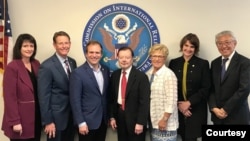
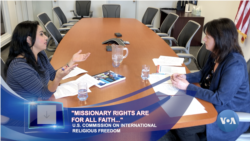

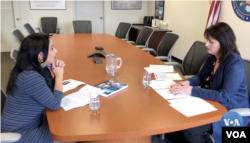
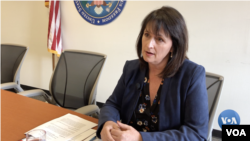
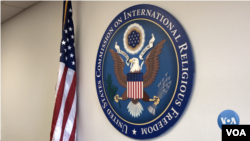
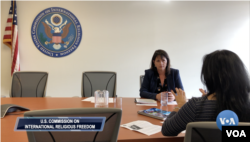
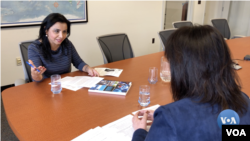
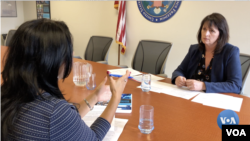


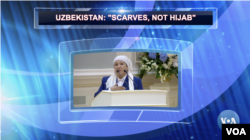
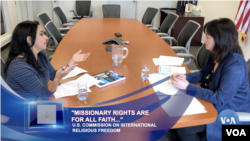



















Facebook Forum